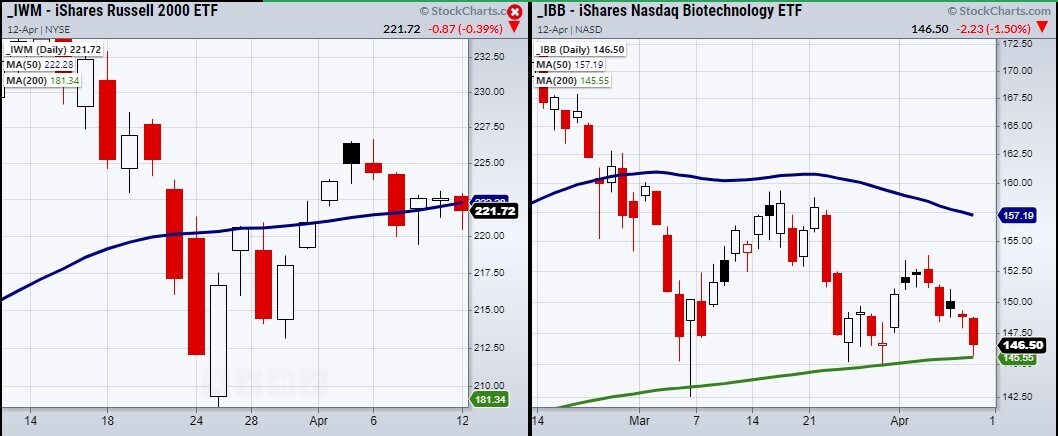In this article, Forrest Crist-Ruiz, assistant director of trading research and education at MarketGauge.com, clears up the uncertain market picture and provides some insight regarding where to look next.
On Monday, the economic modern family, which consists of one index and five key sectors, showed mixed signals as half of the family closed down for the day.
The iShares Russell 2000 ETF [IWM], the iShares Nasdaq Biotechnology ETF [IBB] and the VanEck Vectors Semiconductor ETF [SMH] were down, with iShares Transportation Average ETF [IYT], SPDR S&P Retail ETF [XRT], and Regional Banks [KRE] up on the day.

With SMH lingering in all-time high territory, IWM and IBB are the most worrisome of the bunch, as both sit near pivotal price levels made by their major moving averages.
For IWM, the 50-day moving average (DMA) at $222.28 (the blue line) and IBB, way weaker, sits above the 200-DMA at $145.55 (the green line).
The key difference is their behaviour around their moving averages. For example, if you look at IWM, you can see that it has broken through its 50-DMA four consecutive times in the last four trading days.
IBB already broke its 50-DMA, but now has respected its moving average. Of the four recent days it came close to breaking, it only actually broke once on 5 March.
This shows that if IBB breaks its 200-DMA and closes under, it will have much more meaning. It could impact the IWM to finally break its 50-DMA.
Because IWM cannot be trusted to hold its moving average, we can look at the bigger picture, as the 50-DMA represents more of a price range to hold near than a specific price level to put technical weight on.
This means that, for Tuesday’s trading session, if IWM decides to head lower it will need to hold recent support of $219.39 from the 8 April, while IBB needs to hold over its 200-DMA at $144.55.
If IBB does break under its moving average and into a distribution phase, always watch for a second close under the moving average to confirm the phase change.
This article was originally published on MarketGauge. With over 100 years of combined market experience, MarketGauge's experts provide strategic information to help you achieve your investing goals.
Disclaimer Past performance is not a reliable indicator of future results.
CMC Markets is an execution-only service provider. The material (whether or not it states any opinions) is for general information purposes only, and does not take into account your personal circumstances or objectives. Nothing in this material is (or should be considered to be) financial, investment or other advice on which reliance should be placed. No opinion given in the material constitutes a recommendation by CMC Markets or the author that any particular investment, security, transaction or investment strategy is suitable for any specific person.
The material has not been prepared in accordance with legal requirements designed to promote the independence of investment research. Although we are not specifically prevented from dealing before providing this material, we do not seek to take advantage of the material prior to its dissemination.
CMC Markets does not endorse or offer opinion on the trading strategies used by the author. Their trading strategies do not guarantee any return and CMC Markets shall not be held responsible for any loss that you may incur, either directly or indirectly, arising from any investment based on any information contained herein.
*Tax treatment depends on individual circumstances and can change or may differ in a jurisdiction other than the UK.
Continue reading for FREE
- Includes free newsletter updates, unsubscribe anytime. Privacy policy



